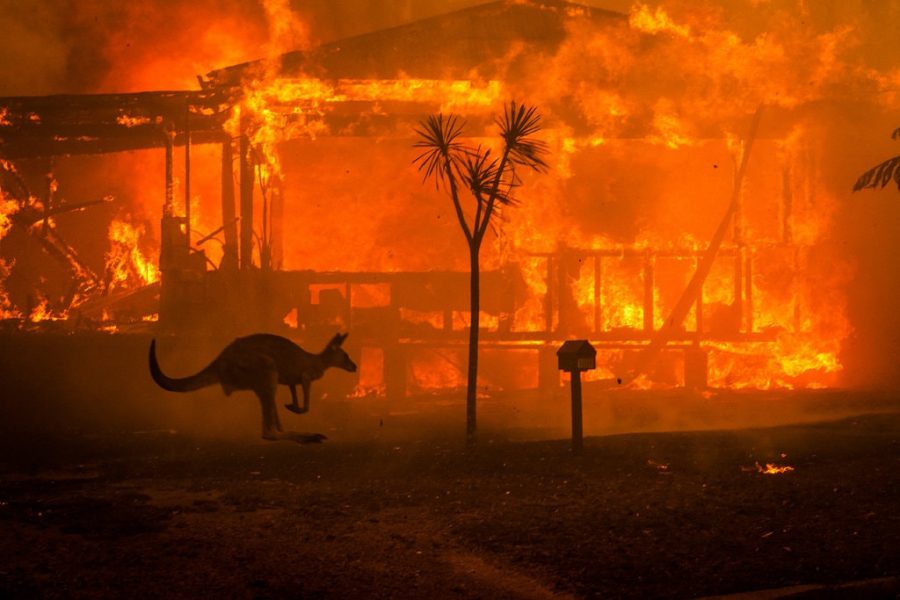Who is to blame for the Australia wildfires and why is there so much misinformation?
Photo by Matthew Abbott for The New York Times
Looking for someone to point the finger at for the devastating brush fires in Australia? Look no further than oil and gas companies.
February 18, 2020
Australia’s devastating bush fire season has killed at least 25 people, almost half a billion animals, and left over 1000 people homeless. When the time comes to blame someone or something for the intensity of this year’s fires, some people immediately blame global warming without taking time to consider who’s contributing to them the most. But, if you look closely, it’s quite clear who’s at fault.
Oil companies and gas producers such as Chevron, Exxon, Shell, and BP (aka carbon majors) have left an enormous carbon footprint that makes up approximately two-thirds of the greenhouse gasses in the atmosphere. I think they directly contribute the most to the global warming epidemic currently plaguing our planet.
The Australian wildfires are a simple case of wealthy companies not wanting to cut back on the dangerous toxins they’re producing. So if it’s this simple, then how come no one’s talking about it?
Well, oil companies and gas producers get away with littering toxins and ravaging our planet because the average person fails research beyond on the term “global warming.” Instead of putting in more effort to figure out who should be blamed for the outrageous wildfires, many people simply say “oh, it’s global warming” and call it a day.
In addition to the public’s lack of research, there’s a misinformation epidemic.
Prominent figures, such as Donald Trump Jr., have fueled the fire (excuse the pun) by spreading false numbers and conspiracies about who’s to blame for the extreme conditions Australia is experiencing. For example, Fox News host Sean Hannity and Trump Jr. both inaccurately tweeted about “200 arsonists” who were supposedly arrested and suggested that they could be blamed for starting the fires.
The outrageous claim was disproven once the New South Wales Police Force released a statement saying that since November 2019, 183 people have had legal action taken against them for “fire-related offenses.” These offenses can range from littering a cigarette to creating a fire hazard by misusing machinery. Furthermore, “legal action” can be defined as giving someone a warning or a ticket and doesn’t necessarily translate to an arrest being made.
Misleading Twitter posts like those of Trump Jr. and Hannity have pushed loads of inaccurate data into the public, resulting in many people overlooking the oil companies that are actually responsible.
The slow pace at which news outlets began talking about the fires didn’t help, either. I personally learned about what was happening in Australia by watching celebrity-made videos asking for American donations on TikTok and Instagram; American news sources didn’t seem to talk about Australia until millions of acres had already burned. Although they weren’t spreading misinformation, the lack of coverage and hard facts about what was happening made people more prone to overlook the oil companies and believe false claims.
So, this year’s alarming bush fire season in Australia wasn’t due to`crazed arsonists, or a streak of bad luck; Australia has clearly been a victim of the awful effect carbon majors have had on the environment.
These wealthy companies who are at fault shouldn’t be overlooked. Instead, they should be exposed for their heavy contributions, not only to this year’s bush fire season in Australia, but also their daily contribution to global warming through the abundant amount of greenhouse gasses they put into the atmosphere.
Since carbon majors are to blame, they should be offering the most help. So far, celebrities have raised the most awareness and donated the most money to help Australia. Oil companies and gas producers should pay greater retributions and match the monetary and moral support from Hollywood during these hard times.
In addition to matching support, carbon majors should work harder to decrease their carbon footprint and implement more eco-friendly policies. These companies can’t undo the damage they’ve caused, but they can and should work towards a cleaner future.






